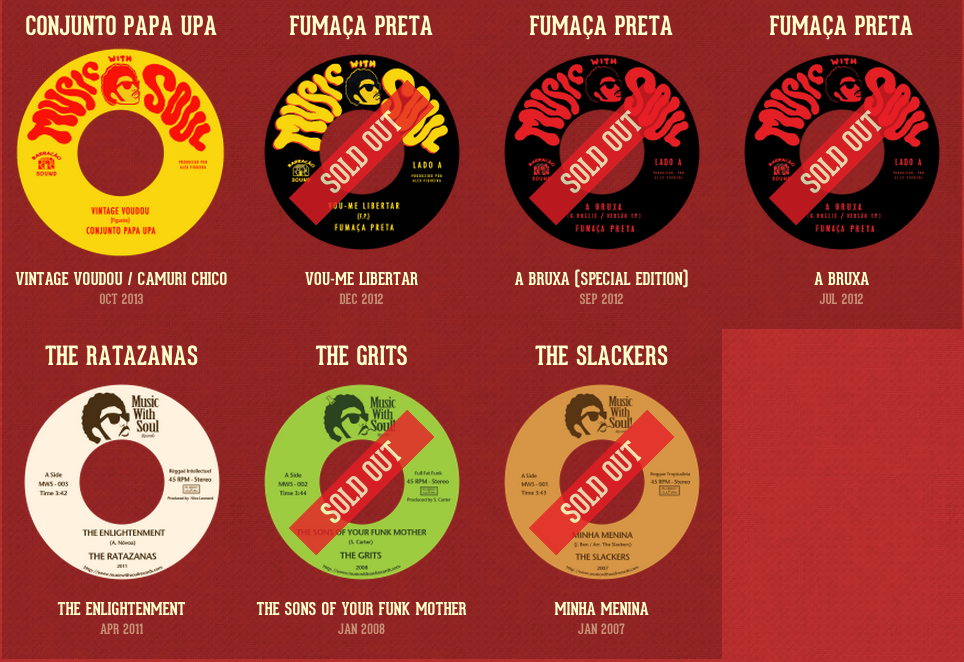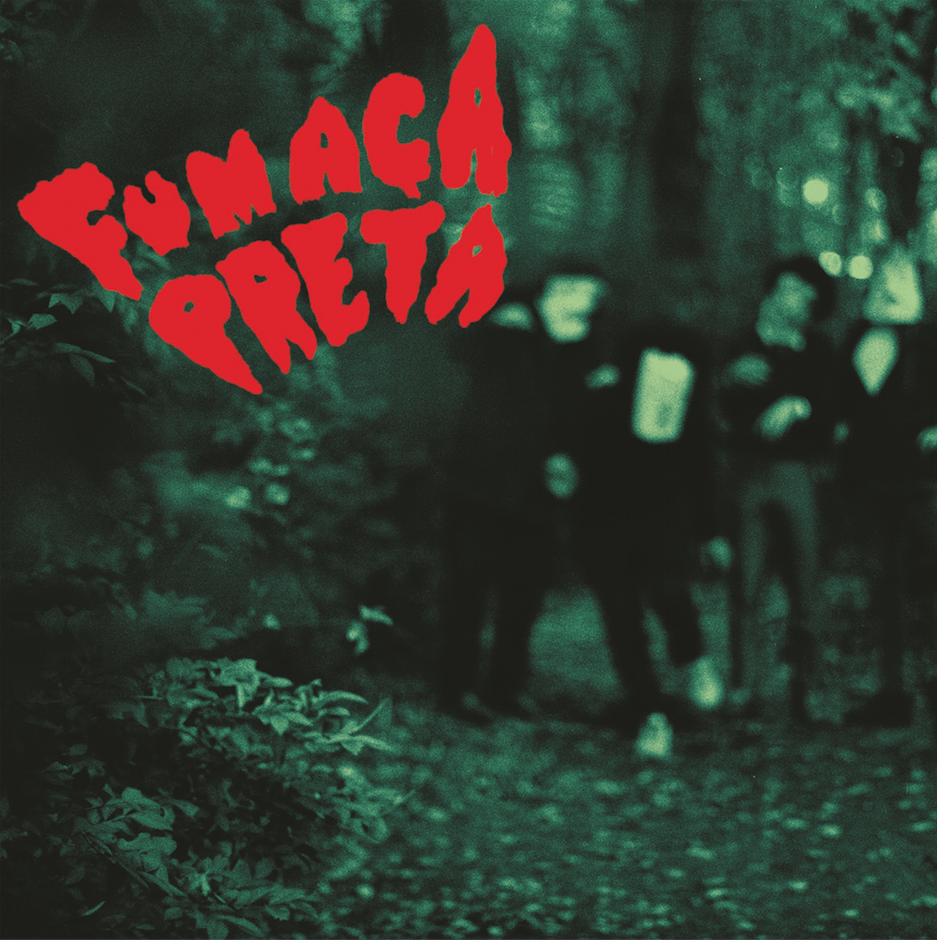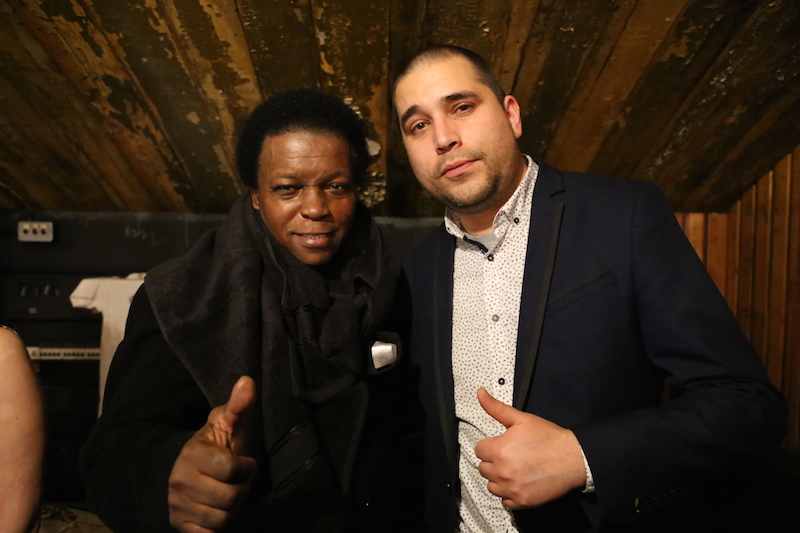In Conversation: Fumaça Preta
The original, shorter version of this article can be found in Now Then Manchester issue 15 (Jan 2014), brilliantly backgrounded with some Mysterious Cities of Gold art from Kid Acne.
My final gig of last year was also the best. To call Fumaça Preta ‘incendiary’ in their live incarnation is entirely apt (their name means ‘black smoke’ in Portuguese) but somehow doesn’t quite get the feeling across. Pure punk attitude screaming through Afro and Latin percussion, married with Radiophonic Workshop-evoking weirdness and lots of shouting (reminiscent of unhinged warlocks conjuring up something particularly twisted) sums them up a little better, but they’re a band who would prefer not to be pigeonholed. Regardless, their appearance at the Finders Keepers Christmas party at the Roadhouse blew the place apart, full of energy, noise and unpredictability.
The self titled album has also made plenty of ‘best of 2014’ lists, including Strut, The Quietus and Rough Trade. Buy it over at Soundway Records.
The band consists of Brighton-dwellers Stuart Carter and James Porch (of funk outfit The Grits) together with Alex Figueira, the Venezuelan-Portuguese founder of the Music With Soul record label and owner of Amsterdam’s Vintage Voudou record shop. Joining them on percussion tonight was Baldo aka Baldomero Verdu. I caught up with the first three to investigate their sound, how others perceive their music, and the Vietcong.
So what brought you to Amsterdam?
Alex: A combination of falling in love with a Dutch girlfriend, my best friend living there and me being sick of Portugal where I lived before. I met (James and Stuart) there.
Stuart: I was putting on a gig for one of my other bands and we got together in the studio one day, recorded some music, it sounded quite good so we released that as a single (A Bruxa c/w Loco, Music With Soul, 2012) and did it again six months later (Vou-Me Libertar c/w Eu Era Um Cão, Music With Soul, 2012). It was always just a studio kind of project, we never thought about what it was going to turn into.
The Grits have a certain sound, I image this is more like your sonic playground?
Stuart: That was it, yeah. When we did The Grits it started off as a Meters (influential New Orleans funksters) sort of thing, and then it developed slowly and went off in different directions but this… it was like, we have no idea what we’re gonna do, we’re just gonna go into a room and do it. We have a lot of funk influences, but before that I was really into heavy metal and acid house. Alex has a huge range of completely different influences that I’ve never even heard of, so we could do whatever we wanted. There were no parameters, no boundaries.
I imagine the funk scene can become stagnant in some areas.
Stuart: Absolutely, but I think the thing with the funk scene is, people still seem to want to buy, say, a J.B.’s album (James Brown’s backing band, active in the 70s and early 80s). They don’t want a J.B.’s album with anything added to it, they just want to buy a J.B.’s album, or a Meters album, or a soul album. Daptone, for example – I love their recording philosophy but the music is pretty straight ahead old funk. It seems like the market, the people that buy that sort of stuff, don’t want it to go anywhere else.
Alex: But at the same time they ended up being sick of it and not buying it anymore, that’s why shops closed, bands didn’t find gigs anymore, it’s kind of a paradox.
Stuart: So you try and do anything new with it, and people are like, ‘That’s a bit too weird, I want to listen to the J.B.’s’.
James: It’s the same with so many things. In Brighton there’s a very strong jazz scene, and the thing with jazz is it’s completely freeform, you can do whatever the fuck you want, as long was it sounds like jazz. If it doesn’t sound like jazz, people will go, ‘Oh, this isn’t fucking jazz, I’m pissed off now. I’m a purist.’ Loads of people have that problem in the jazz world, and they think, ‘fuck it’, and they give up and just do straight jazz, and go, ‘yeah, I respect the greats,’ and it’s a shame.
Stuart: There’s a certain radio show that specialises in funk music. The first album they were all over, it was pretty much like The Meters, wasn’t it? Add some electronics and fuzz guitar and stuff, any deviation from that…
So to do Fumaça Preta was amazing because we did whatever we wanted. We had no thought about whether anyone was going to buy this, if anyone was going to like it…
Alex: Since you touched that subject, when I met Stu was when I put the 45 out from The Grits, The Sons of Your Funk Mother (c/w Mwauu, Music With Soul, 2008), I was arranging a gig for them in Amsterdam. I went to the MySpace page and it was the first song out of the four, and my first impression was, ‘what the fuck is this?’, because it sounded like funk, but instead of having a guy trying to sound like James Brown which is what most bands had, it had James doing like a punk thing on it, and it was crazy. I said, ‘Hey, who’s putting this out?’ because it wasn’t on (UK funk label) Freestyle I knew, and they said, ‘Nobody, Freestyle didn’t like it, do you know anyone who wants to put it out?’. I had just put a 45 out (The Slackers, Minha Menina c/w No More Cryin’, Music With Soul, 2007) and I was looking for other stuff. So I said, ‘yeah, I know someone…’
I remember listening to that when I picked it up in Fat City. It stood out, with that real raw sound.
Alex: We needed a B-side. He gave me a few options but I said no, this is not crazy enough. I asked him, give me something insane. He did Mmwauu, which turned out to be the reason that people bought the 45!
Stuart: Yeah, Mmwauu took off crazily compared to the A-side.
What was the 45 you put out before that?
A band of a friend of mine called The Slackers, from New York. Great people, I love them. (The Grits) are raw, I started a label because I wanted to see music on vinyl that had that philosophy, and they perfectly matched, just like The Slackers did. I think they’re more open minded than their fanbase. If they weren’t so loyal to their fanbase, I think they’d be doing some really crazy shit, insane stuff.
(With the label) I wanted to say ‘fuck you’ to the music industry, on a ridiculously low level. It was my fuck you, like you guys are putting a lot of crap out, nobody’s putting proper exciting shit out, because you’re scared of too much bullshit. I wrote a bit of a manifesto, it’s on the webpage.
James: I don’t think you want to give the impression, though, that there’s not good stuff out there.
Alex: There is a lot of great stuff out there, it’s not about that. I was just not finding it. I used to go to the record shop, practically every week. When I moved to Amsterdam, it was the first time I actually had money to buy records. I was trying to go crazy and I didn’t find new stuff. Plenty of old stuff, reissues and comps, lots of great shit but when it came to the new stuff I found that a lot of the time the music was right… but the recording wasn’t. That was my whole point.
So you have your own studio in Amsterdam – I take it you have a very specific way of recording?
It was the second step of the label because I was finding it really hard to find bands with (the knowledge). I kept on getting demos from bands and I kept having that feeling – the music was cool, I like it but it sounds like shit, sorry.
So an Idiot’s Guide – what does the studio consist of?
James: I’ve got a good (comparison). In Vietnam, the Americans had a system of microphones in the jungle. Some really clever American guys, they devised microphones that looked like plants. They hung them up in the jungle. The Vietcong were walking through, and of course they’re looking at plants every single fucking day. And someone goes, ‘What the fuck is this plastic plant, here?’, and all they did was look for plants that looked blatantly the wrong colour and size, which was obvious to them. You know what, they pissed on them. And that’s what we do with recording.
Stuart: It’s happened throughout the history of music, hasn’t it. That’s why we have generic stuff.
Alex: Sometimes we have a gig and we try to convince the sound engineer to put a 58 (SM58, standard vocal mic) on the kick and he looks at us like, you guys are fucking mental.
James: Say that we’re not stupid retro.
Stuart: We’re not retro!

Alex: That’s a label that I would wipe my ass with. I like tape, not because it’s retro and it’s fancy and bullshit, it’s because it sounds like it sounds. If someone makes an ultra-modern laptop that has that sound, I would embrace it ‘cos tape is fucking expensive and inconvenient and has all kinds of disadvantages that I could be the whole night listing.
Stuart: We go to tape first of all because it sounds amazing, and it focuses you because you know have 24 minutes to get three tunes down. It just makes you so much better in the studio. But then we still use computers.
Why Soundway then? Did they give you the freedom to do what you want?
Alex: No, the album was made before Soundway. We gave them the album completely ready, it just needed a master. It was Soundway because they were the only label that liked it, of the labels I tried. I mean I didn’t try many, I only tried labels that I thought had an affinity to our sound.
I didn’t send 200 demos and 200 emails, I sent a few and out of those I chose, they were the ones that said yeah.
Stuart: With Soundway, they were happy to release it if it wasn’t a success.
Alex: Exactly. They wanted to take the risk.
Stuart: They just liked it. They said, even if we sell 500 copies, don’t give a fuck because it’ll be great to have had it out. But it’s taken off much more than we expected, much more than they expected. Which is fantastic. Miles (Cleret, founder of Soundway Records) was so into it, and the fact they didn’t care if it succeeded or not, they just wanted to be involved with it is the main reason for them.
Alex: Other people replied to me, ‘This is fucking amazing, the best shit I heard in whatever years, but I can’t put it out, I’m sorry.’ I was so puzzled I didn’t even ask why.
Stuart: Soundway said at the start, they didn’t expect to sell it. They thought, it didn’t fit into a genre, they didn’t know what market it was going to appeal to, but they were happy to do it regardless of that because they loved it.
You must find yourselves having to define your sound. Is that frustrating?
Alex: To be honest I’d rather spend that time philosophising about the name and bullshit, making new music in the studio and leave that to other people. Journalists.
Stuart: To ‘what sort of music do you play?’ we sometimes answer sensibly…
Alex: We need a journalist to come up with a name.
James: I think the problem is that every name is stupid. If you’ve never heard of a band, every name is stupid. Har Mar Superstar. That’s stupid. But I like his music, he’s funny. The Beatles is the most stupid name ever.
Alex: I’d rather go on, as long as this band goes, without being labelled as a funk band or a psych band or whatever.
Do you have ideas for the second album?
Stuart: Oh, absolutely. We have some recordings… I’m not sure how we’re going to do it yet.
It’s @fumacapretaband #soundway
A photo posted by Agent J (@jamiegroovement) on
Do you incorporate improv into the recording sessions?
Alex: No telling, no telling!
Stuart: We have a few options as to how we approach it, we’re not sure yet. We don’t know.
James: I go for the Phil Spector approach. I lock myself in a room, with guns and shoot them to the ceiling.
Alex: We’ll play a couple of tunes that might make it to the second album tonight, you might recognise them if you’ve listened to the first record and singles. They might make it, they might not, but we’re playing them.
And how is your label, Music With Soul?
Alex: Well, it’s supposed to be alive. I’m officially not broke, I almost have enough money to put another 45 out, which has been recorded and ready for a year and a half. I just need to redo the vocal and I haven’t had the time.
I used to do 500 copies, but I’m not going to do 500 anymore because they’re a pain in the ass to get rid of. The last one I pressed, I still have like, 80. I’ll do less. If I could do 100 I would, but the cost…
Have you been playing as a live outfit for long?
Stuart: Not really, when we recorded the album we didn’t even think of doing it live. Then earlier this year, May sort of time, we got asked to do some shows.
Alex: When we announced the deal with Soundway, we started getting offers to play live. So I was like: Stu, look, there is a chance to actually make a bit of money with this thing, bring it to the stage – which is something that really appeals.
Stuart: And to play live which we love.
It must be a very different animal than in the studio.
Alex: It’s always a different animal, always. We do versions of our own tunes sometimes, when we feel like it.
Stuart: We started off trying to recreate everything using a lot of technology. We’ve kind of cut down on that a bit.
Alex: We don’t have the Danish string quartet with us…
Stuart: There’s tracks on the album with the string quartet, bass clarinet, there’s loads of stuff on there. We tried to do that to start off with but as we played together more live, we got better as a band so we could work it and make it more energetic, and work as a four piece. It’s been great fun, I love playing live, especially with this music, and it’s really nice that it’s worked out.
Can we look forward to the next album’s release in 2015 then?
Alex: If we find the time. We’re stupidly busy, I would love to. I’d love to every three months if I had the time…





